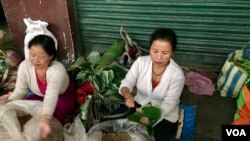At a grocery store here in the capital of Sikkim state, in India's northeast, a shop assistant tears a sheet from a stack of old newspapers on the counter to wrap a customer's purchases. Another stall owner places fermented soybeans in a large leaf, then ties the purchase up for a shopper in a local market.
Nestled on Himalayan slopes, Sikkim replaced plastic bags with paper or cloth bags and even leaves long before environmentalists raised an alarm about plastic choking cities and oceans. It imposed the ban on plastic bags after a spate of landslides in 1998, when experts feared they were partly caused because drains choked with plastic waste left no outlet for torrential rainwater.
As India gears up to announce a nationwide push to eliminate single-use plastic this week, the state with the country's smallest population is being hailed for launching the battle two decades ago.
It took time to teach a state to turn away from the convenience of using plastic bags which were banned.
Public awareness
"There was a lot of policing during the initial days. There were fines if people were caught carrying plastic bags," says Priyadarshinee Shrestha, a team leader with World Wildlife Fund in Sikkim and a volunteer with Zero Waste Himalaya, a group that promotes environmental sustainability.
"It is spoken of at almost every forum as one of the green initiatives of Sikkim. Most people are aware of it."
Extensive public education campaigns helped turn people away from plastic bags.
As she sells curios in a shop, 35-year-old Prabha Sherpa recalls how younger children would come from school and explain what they had been taught about the environmental hazards posed by plastic, particularly in a state where Himalayan slopes leave limited space for landfills.
"We stopped using it happily because we understood that it is good for us," she said, adding that most people willingly follow the rule.
Successful head start
Most shoppers come to the city's main vegetable market with cloth bags for their purchases, and stalls offer colorful ones for sale. Pastries and sandwiches from shops are served on plates of paper, leaf and bagasse — a fiber byproduct of sugarcane processing — rather than plastic.
Some believe Sikkim's small size just over 600,000 people helped make the initiative a success.
Studies in 2014 and a 2018 survey by environmental groups found that in Gangtok and other Sikkimese towns, plastic bags are used much less but that the ban did not have the same success in outlying areas.
While Sikkim has a head start in the bid to ban plastic, the battle is far from over. Aside from bags, many other plastic items have crept into the state like non woven polypropylene bags, which look like cloth but are made of plastic. Garbage bins are stuffed with plastic wrapping from packaged foods such as wafers and noodles that are popular among the local population, and tens of thousands of tourists who flood the Himalayan state leave behind thousands of empty plastic water bottles.
"Plastic is so omnipresent. The whole problem is that you have to stop it at the tap and use more organic packaging but that is not happening," Rajendra Gurung, who heads the Ecotourism and Conservation Society of Sikkim, said.
Some communities are taking action. In Lachen, a village that serves as a gateway to a picturesque high-altitude lake, tourists are banned from bringing in plastic bottles or disposing of plastic trash, and the message is spread by taxi drivers who ferry them in. The community-driven initiative was the result of a cleanup organized by volunteer groups.
"That was as an eye opener. They realized they were not using any of the plastic stuff that was in their trash, it was the tourists who were bringing it in and then leaving it behind," Shrestha said.
The government also recently set an example by replacing packaged bottled water for employees or visitors with reusable bottles that are filled with filtered water in its offices. It is also promising stricter implementation of a wider ban that has been announced on all single-use plastic items, such as plates, spoons and forks.
"Enforcement has to be really strengthened. That is always the problem in our country," Anil Raj Rai, mission director of the government-led Clean India Mission in Sikkim said.
"We are working on that. Even police will be empowered to take action," he said.
That has given heart to volunteer groups that besides carry bags, Sikkim will banish single-use plastic. "We are already several steps ahead and if the government is more strict, we will be able to achieve it more quickly than others," said Gurung.
That is what struck Aparna Lakhotia, who runs a popular café in Gangtok, when she came to live in the city a year and a half ago from Chennai in southern India.
She is surprised at the high level of awareness among people about the hazards of plastic, which stands is in stark contrast to Chennai, where plastic usage is still rampant despite a ban imposed this year, due to public apathy and poor implementation.
"It is far less polluted with plastic litter than other cities, it is so much cleaner here," she said.






